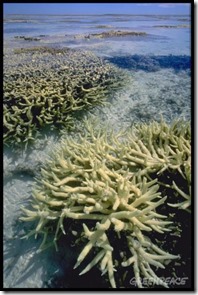On 22 April Lucy Tweeted that she was off the coast of Africa for EarthDay and she was participating in a study of coral bleaching (death) due to Climate Change. This scientific study (released by Greenpeace) concludes that if climate change is not stopped, coral bleaching is set to steadily increase in frequency and intensity all over the world until it occurs annually by 2030 - 2070.
Today (29 May 2013), Lucy tweeted photos from this event and went on to explain what a FAD was. Turns out it's a Fish Aggregating Device.
Can you gather data where you swim? “@Coral_Watch: Corals turn to algae 4stored food when times tough Science Codex pic.twitter.com/HtkDRraQem
— Lucy Lawless (@RealLucyLawless) May 29, 2013
Kids found a F.A.D. net attached to reef. Went on a rescue mission with Lindsay&Juliet of @WiseOceans. @Coral_Watch pic.twitter.com/Dt7l5jEfRT
— Lucy Lawless (@RealLucyLawless) May 29, 2013
My groovy sons dived to detach the net so the coming squall would not dredge the reef. @coral_watch @WiseOceans pic.twitter.com/HzqTK8jFKi
— Lucy Lawless (@RealLucyLawless) May 29, 2013
Bringing the reeking FAD net in b4 dark. No boat available. All we had was this pedal boat. What a nutty adventure! pic.twitter.com/EImHTDub96
— Lucy Lawless (@RealLucyLawless) May 29, 2013
@sailvarmint Fish Aggregating Device
— Lucy Lawless (@RealLucyLawless) May 29, 2013
Coral bleaching is a condition that can seriously damage and kill entire coral reefs. Corals contain microscopic algae called zooxanthellae that provide the coral with food and give them their vibrant colours. Rising ocean temperatures cause corals to become stressed, and they expel the zooxanthellae and turn white or "bleach". If zooxanthellae do not return to the coral’s tissue, the coral will die.
As little as a 1° Celsius (1.8°F) increase in temperature above thesummer maximum can cause corals to bleach. Tropical seatemperatures have increased by 1° Celsius over the past 100 years andare predicted to continue rising.
An example of this problem is Australia's world famous Great BarrierReef, which lies off the state of Queensland. At around 2,000kilometres (1,243 miles) long it is the world's largest reef.
But in 2002 the reef experienced its worst ever case of coralbleaching, with over 60 percent of the reef being affected. Unlessprojected levels of climate change are slowed, much of the reef will bedead in decades. Deprived of their living homes, hundreds of speciesrelying on the reef will also die out.
What is Coral Bleaching?
See more of Lucy's role as an Eco-Warrior and Greenpeace Ambassador
